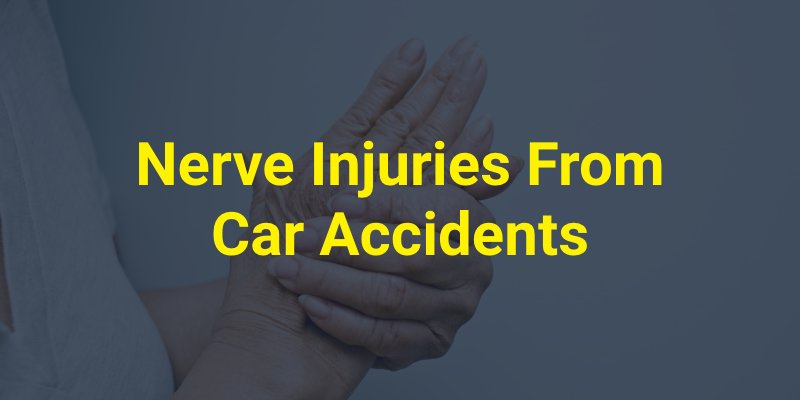Car accidents can have severe consequences for those involved, both physically and emotionally. While many are aware of the common injuries such as broken bones or whiplash, there is one issue that often goes overlooked – nerve injuries.

Several types of personal injury incidents could potentially lead to nerve damage. Here are a few common scenarios:
Car Accidents: High-impact collisions can cause whiplash, spinal cord injuries, or other trauma that may result in nerve damage.
Slip and Fall Incidents: Falls can cause traumatic brain injuries (TBIs), back injuries, or broken bones which might pinch or sever nerves.
Construction Accidents: Injuries from construction accidents such as falling debris, being crushed by heavy machinery, falls from heights, etc. often result in severe harm including nerve damage.
Other Workplace Accidents: Repetitive strains from tasks like typing for extended periods or lifting heavy objects improperly could gradually cause nerve damage over time. Not all workplace injuries are from one incident.
Medical Malpractice: Botched surgeries, inappropriate medical treatments, or an incorrect diagnosis can result in nerve damage.
Any form of personal injury leading to nerve damage can have profound long-term effects on an individual’s life. It is advisable to consult a healthcare professional for immediate medical attention when involved in any of these incidents. Additionally, consider seeking legal advice from a personal injury lawyer who can help you understand your options for compensation if another party was at fault.
Understanding nerve injuries is vitally important for accident victims who wish to ensure appropriate medical treatment and pursue fair compensation claims. Immediate symptoms may include numbness, tingling sensations, or a burning feeling in the affected area.
However, it is important to note that some nerve injury symptoms might not emerge immediately after an accident. Delayed symptoms could manifest as muscle weakness, loss of coordination, and lead to partial or complete paralysis in severe cases.
The emotional and psychological impact of nerve injuries should not be underestimated either. Living with chronic pain or limitations related to nerve damage can significantly diminish both quality of life and mental well-being. It is essential for both medical professionals and legal advocates involved in these cases to recognize this when assessing damages suffered by accident victims.
Following an accident, if you suffer from nerve damage, seeking compensation for medical expenses and other losses is within your rights. However, achieving this often demands a substantial accumulation of supporting documentation to effectively prove your claim.
Collect comprehensive medical records outlining your nerve damage diagnosis, prognosis, and necessary treatment plans. This proof must be explicit in linking the injuries sustained to the accident’s aftermath.
Engaging an experienced personal injury attorney is crucial when navigating insurance claims processes. Insurance companies may try to minimize payouts by disputing liability or downplaying the severity of nerve injuries or writing them off as pre-existing conditions. A skilled Phoenix car accident lawyer will advocate on behalf of the victim by gathering evidence, negotiating with insurers, and ensuring fair compensation based on actual damages suffered.
Being a victim of a car accident can lead to significant consequences, and dealing with nerve injuries can be physically and emotionally taxing. Recognizing the symptoms and knowing what to do gives you the best chance at recovering compensation. If you need help, don’t try to handle it alone. Contact us today to schedule a free consultation.